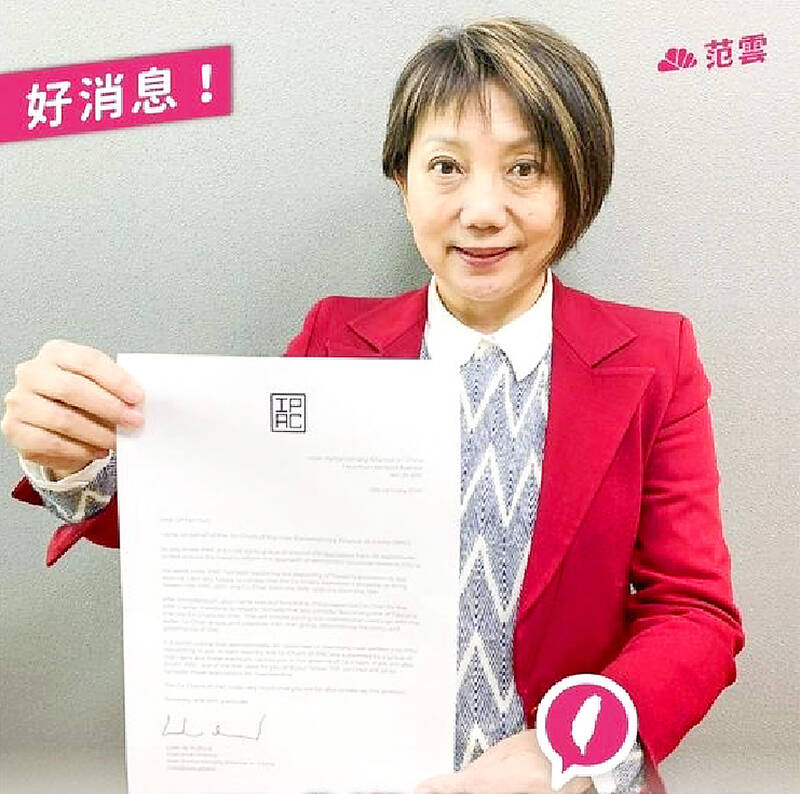Taiwan has been invited to join the Inter-Parliamentary Alliance on China (IPAC), highlighting its key role in resisting Beijing, and that democratic countries want Taipei to join their alliance, Democratic Progressive Party (DPP) Legislator Fan Yun (范雲) said yesterday.
Founded in 2020, IPAC consists of 250 legislators from 30 countries across five continents, who are working to reform how democratic nations approach China.
The alliance must reach a certain degree of consensus regarding which countries can become member states, with two legislators from two different parties on each country’s political spectrum chosen to be cochairs to ensure representativeness, Fan said.

Photo copied by Hsieh Chun-lin, Taipei Times
After passing a resolution, IPAC invited Taiwan People’s Party (TPP) Legislator Jang Chyi-lu (張其祿) and herself to be cochairs representing Taiwan’s legislators in the alliance, Fang said.
“It is hard-won progress,” as IPAC requires two legislators from two major parties to join, but Taiwan’s main opposition party — the Chinese Nationalist Party (KMT) — has continuously boycotted it, so Taiwan’s participation had been stalled, she said.
Thankfully, many legislators approached IPAC — applying for membership, joining its summit in Washington in September last year and attending its regional meetings — so despite the KMT’s opposition, IPAC finally invited Taiwan to join, valuing the nation’s key role in resisting China, Fan said.
This progress confirms that democratic countries want to form an alliance with Taiwan, she added.
Since the US-China trade dispute began, China’s Belt and Road Initiative “debt trap” and human rights abuses have been exposed, and with its “friend” Russia invading Ukraine, an alliance of democratic countries is taking form, while issues surrounding Taiwan are becoming more important, Fan said.
“We are working hard so that Taiwan can participate in international organizations, and joining IPAC is the first step in opening up new prospects,” she said.
Fan said she is glad to know that 40 legislators in Taiwan have applied for IPAC membership, adding that once she begins her duties as cochair, she plans to assist like-minded legislators in obtaining membership.
Fan said that she would also make a concerted effort to convey to the world that Taiwan would defend itself, pursue peace, not concede to China’s political intimidation or military coercion, and stand with democratic allies in resisting authoritarianism.

A Ministry of Foreign Affairs official yesterday said that a delegation that visited China for an APEC meeting did not receive any kind of treatment that downgraded Taiwan’s sovereignty. Department of International Organizations Director-General Jonathan Sun (孫儉元) said that he and a group of ministry officials visited Shenzhen, China, to attend the APEC Informal Senior Officials’ Meeting last month. The trip went “smoothly and safely” for all Taiwanese delegates, as the Chinese side arranged the trip in accordance with long-standing practices, Sun said at the ministry’s weekly briefing. The Taiwanese group did not encounter any political suppression, he said. Sun made the remarks when

The Taiwanese passport ranked 33rd in a global listing of passports by convenience this month, rising three places from last month’s ranking, but matching its position in January last year. The Henley Passport Index, an international ranking of passports by the number of designations its holder can travel to without a visa, showed that the Taiwan passport enables holders to travel to 139 countries and territories without a visa. Singapore’s passport was ranked the most powerful with visa-free access to 192 destinations out of 227, according to the index published on Tuesday by UK-based migration investment consultancy firm Henley and Partners. Japan’s and

BROAD AGREEMENT: The two are nearing a trade deal to reduce Taiwan’s tariff to 15% and a commitment for TSMC to build five more fabs, a ‘New York Times’ report said Taiwan and the US have reached a broad consensus on a trade deal, the Executive Yuan’s Office of Trade Negotiations said yesterday, after a report said that Washington is set to reduce Taiwan’s tariff rate to 15 percent. The New York Times on Monday reported that the two nations are nearing a trade deal to reduce Taiwan’s tariff rate to 15 percent and commit Taiwan Semiconductor Manufacturing Co (TSMC, 台積電) to building at least five more facilities in the US. “The agreement, which has been under negotiation for months, is being legally scrubbed and could be announced this month,” the paper said,

MIXED SOURCING: While Taiwan is expanding domestic production, it also sources munitions overseas, as some, like M855 rounds, are cheaper than locally made ones Taiwan and the US plan to jointly produce 155mm artillery shells, as the munition is in high demand due to the Ukraine-Russia war and should be useful in Taiwan’s self-defense, Armaments Bureau Director-General Lieutenant General Lin Wen-hsiang (林文祥) told lawmakers in Taipei yesterday. Lin was responding to questions about Taiwan’s partnership with allies in producing munitions at a meeting of the legislature’s Foreign Affairs and National Defense Committee. Given the intense demand for 155mm artillery shells in Ukraine’s defense against the Russian invasion, and in light of Taiwan’s own defensive needs, Taipei and Washington plan to jointly produce 155mm shells, said Lin,